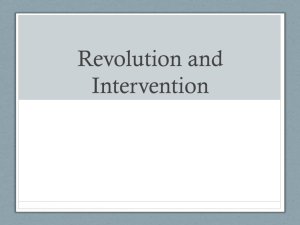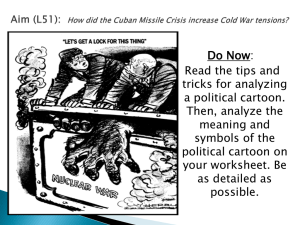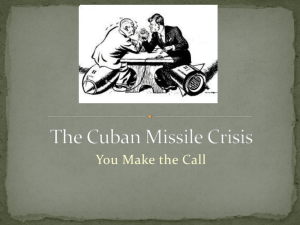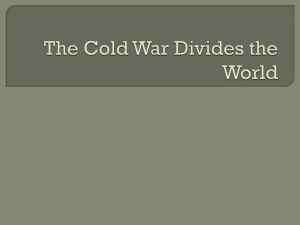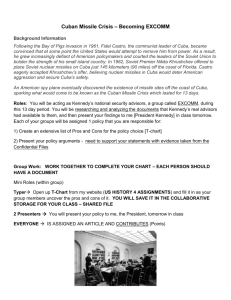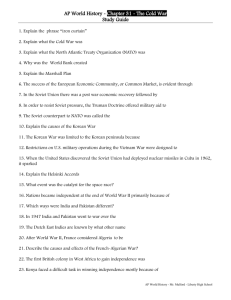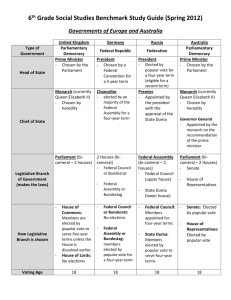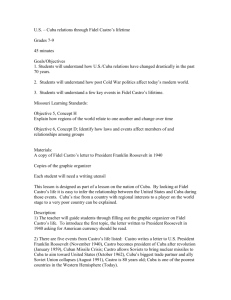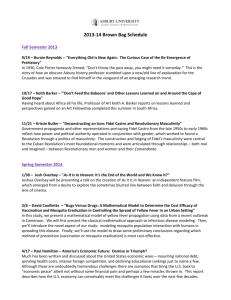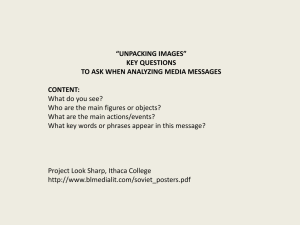CHAPTER 27
advertisement
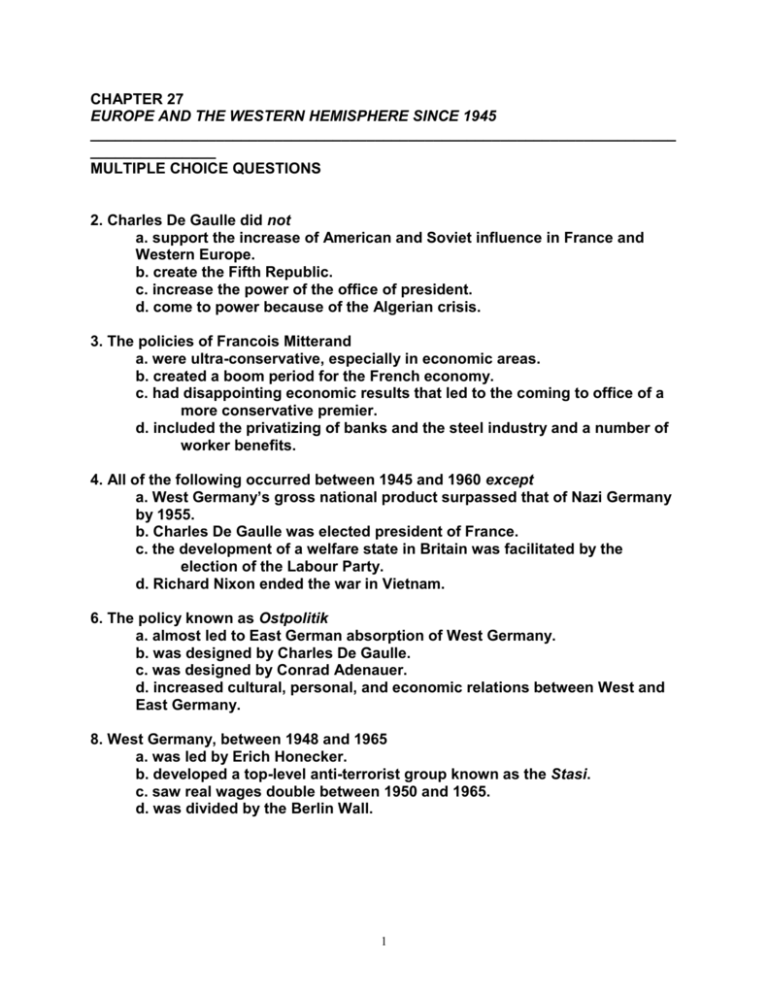
CHAPTER 27 EUROPE AND THE WESTERN HEMISPHERE SINCE 1945 ______________________________________________________________________ _______________ MULTIPLE CHOICE QUESTIONS 2. Charles De Gaulle did not a. support the increase of American and Soviet influence in France and Western Europe. b. create the Fifth Republic. c. increase the power of the office of president. d. come to power because of the Algerian crisis. 3. The policies of Francois Mitterand a. were ultra-conservative, especially in economic areas. b. created a boom period for the French economy. c. had disappointing economic results that led to the coming to office of a more conservative premier. d. included the privatizing of banks and the steel industry and a number of worker benefits. 4. All of the following occurred between 1945 and 1960 except a. West Germany’s gross national product surpassed that of Nazi Germany by 1955. b. Charles De Gaulle was elected president of France. c. the development of a welfare state in Britain was facilitated by the election of the Labour Party. d. Richard Nixon ended the war in Vietnam. 6. The policy known as Ostpolitik a. almost led to East German absorption of West Germany. b. was designed by Charles De Gaulle. c. was designed by Conrad Adenauer. d. increased cultural, personal, and economic relations between West and East Germany. 8. West Germany, between 1948 and 1965 a. was led by Erich Honecker. b. developed a top-level anti-terrorist group known as the Stasi. c. saw real wages double between 1950 and 1965. d. was divided by the Berlin Wall. 1 9. The new prime minister of Great Britain immediately after World War II, Clement Atlee, a. included two Communist members in his cabinet. b. was a leftist revolutionary, whom the king removed two months after he took office. c. favored abolition of all private banks in the country. d. established the welfare state in Britain. 10. Thatcherism a. increased the benefits of the welfare state. b. restricted union power. c. increased the power of the labor unions. d. resulted in high unemployment in southern England. 11. The founding of the European Economic Community a. initially received strong encouragement from the Soviet Union, which played a leading role until the Cold War erupted. b. established a customs union for its six member states. c. initially embraced the Benelux countries, along with Sweden and Czechoslovakia. d. was initially designed with the hope it would stabilize employment for the working classes, but this hope was soon shown to be impossible. 12. The European Community was primarily a. an economic union. b. a political union. c. a military alliance. d. restricted to the nations of southern and eastern Europe. 15. Which of the following statements is not correct about John F. Kennedy? a. He was the youngest elected president, and the first president to be born in the twentieth century. b. He focused exclusively upon domestic matters rather than foreign affairs. c. He was involved in a missile crisis with the Soviet Union. d. He attempted to oust Fidel Castro from Cuba. 17. The movement for civil rights in the United States during the 1950s and 1960s a. was strongly opposed by Malcolm X, a white political leader from Illinois. b. created a “white backlash” which aided a national trend toward greater political conservatism. c. received no governmental support until 1974. d. was a catalyst which energized the Indian and black minorities, who together composed thirty-four percent of the nation’s population. 2 18. Which of the following statements is true? a. Malcolm X led a March on Washington that ultimately led to passage of the Civil Rights and Voting Rights Acts. b. Lyndon Johnson faced a tranquil domestic scene in the years that followed the landmark legislation of the mid-1960s. c. Race riots and anti-war protests led many to vote for more conservative politicians. d. The 1968 election of Richard Nixon signaled a desire on the part of the American electorate for a more permissive social environment in the nation. 20. Jimmy Carter was defeated for reelection in 1980 because a. his hostility toward Jews and Arabs proved politically fatal. b. the economic crises of stagnant oil prices and deflation. c. he failed to obtain the release of American hostages held by radical Moslems in Iran. d. he failed to obtain the release of American spies held by Communist Russia. 21. The Reagan Revolution included all of the following except a. strong support for labor unions and war on poverty programs. b. a decrease in spending on social welfare programs. c. tax reduction. d. an increase in military expenditures. 23. Which of the following is a true statement about postwar Canadian political development? a. Lester Pearson advocated political union with the United States. b. Lester Pearson’s Liberals created Canada’s welfare state. c. Brian Mulroney opposed a free trades agreement with the United States that was very well received by all Canadians. d. Quebec will be granted independence in 2006, as a result of the national referendum. 24. Pierre Trudeau a. was able to maneuver Charles de Gaulle out of power and replace him as President of France. b. was the first prime minister of English ancestry in Canadian history. c. added German, Polish and Indian languages to the officially recognized language list. d. pushed for greater industrialization, but his policies were frustrated by inflation and opposition to his attempts to increase the power of the central government. 3 26. Major developments in Latin America since 1955 have included a. large increases in the incomes of peasants and industrial workers. b. sharp reductions in foreign debt in the 1970s, as governments worked to reduce outsiders’ control of their economies. c. an end to the cultivation of coca and marijuana in the region by 1990. d. an increase in the number of democratic regimes in the 1980s and 1990s. 28. Which of the following statements accurately describes developments relating to Cuba in the late 1950s and early 1960s? a. President Johnson authorized the CIA to train Cuban exiles to invade the island. b. The Bay of Pigs disaster resulted in a Soviet decision to place Soviet missiles in Cuba. c. Fidel Castro was overthrown by Fulgencio Batista. d. Che Guevara successfully established a communist government in Bolivia. 30. Which of the following Latin American politicians would not be described as a dictator? a. Fulgencio Batista b. Juan Perón c. Vicente Fox d. Fidel Castro 31. In Latin America since 1950, a. Mexico is the only major Latin American state that has not seen a massacre of protesting students or workers by government police and/or troops. b. the Soviet Union’s role in the Cuban Missile Crisis convinced the Castro regime it did not need to try to create allied regimes in the Western Hemisphere. c. import-substituting industrialization often led to increased government funding of economic development because of a lack of available private capital, either domestic or foreign. d. no Marxist politician achieved national power. 34. After 1946, higher education in Western Europe a. continued to drew its students from the wealthier classes until the 1990s. b. saw fees increased in a number of universities and enrollment grew dramatically. c. experienced an influx of students from the middle and lower classes. d. declined because of a severe economic recession. 4 36. The most famous student revolt of the second half of the twentieth century occurred at a. the University of California in Berkeley. b. the Sorbonne in Paris. c. Oxford University. d. Columbia University, New York. 39. The women’s movement writer in who wrote The Second Sex was a. Simone de Cognac. b. Simone de Beauvoir. c. Adrienne Koch. d. Germaine Greer. 42. The greatest human-made environmental disaster of the second half of the twentieth century occurred at a. Samarkand. b. Chernobyl. c. Aswan. d. the Three Gorges. 46. Existentialists believed that a. there was a transcendent being who gave meaning to life. b. God was the Prime Mover and First Cause, and not merely a Christian, Jewish, or Islamic God. c. humankind had a preordained destiny. d. the world was absurd and without meaning. 47. The mathematician who developed a primitive computer and the guiding physicist in the development of the atomic bomb, respectively, were a. Jonas Salk and Thomas Edison II. b. Alan Turing and J. Robert Oppenheimer. c. Edward Teller and Nikolai Kropotkin. d. Jackson Pollock and Diego Rivera. 49. Jackson Pollack was a practitioner of a. Existentialism. b. Absurdism. c. Pop Art. d. Abstract Expressionism. 5
